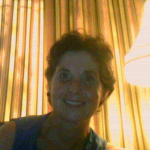Dr Isabel Campbell provides our second “Why I Became an Historian” post. Isabel is a Councillor for the Canadian Nautical Research Society and co-editor of the quarterly publication Argonauta which serves as the CNRS newsletter, and also provides a place for articles less formal than those which would appear in the society’s Journal The Northern Mariner. Argonauta has recently transitioned to online publication and is available from the website.
A tale of an unlikely historian.
As a teenager, I preferred music, math, physics, literature, and drama to history and I had no intention of taking history at university. Instead at Memorial University in Newfoundland in 1974, I signed up for math, biology, psychology, and English and, after hours of waiting in line-ups for my last course, I told the staff that I would take any other course that fit into my schedule.
Fortunately that course turned out to be Ruth Roach Pierson’s introductory course on Nazi Germany. We studied Hannah Arendt’s Eichmann in Jerusalem, Primo Levi’s Survival in Auschwtiz, primary documents about life in the Shtetl and Hitler’s Germany, and historical methods. When the course was over, I changed my major to honours history and then went on to a master’s degree at the University of Western Ontario in 1978-9 where three talented young history professors were being let go with little chance of tenured employment due to cuts across the country. My doctorate was put on hold.
Happily, I had fallen in love with a young biochemical engineer. I decided to pursue a master’s degree in library and information science, hoping to find useful employment in the small communities where we might be posted. After several of these moves, a variety of jobs, and the birth of our first child, I took a term position at the Public Archives in Ottawa in 1985. My husband followed me! I found long term archival employment at National Defence – another happen-chance – but one which taught me a great deal.
After the birth of our second child, I took a few graduate history courses at Carleton University and then did a doctorate on the influence of foreign policy on military decision-making with respect to Canada’s brigade in Europe at Laval University in Quebec. I researched and wrote during the nights and early hours of weekends, while working full time, raising two energetic children, and volunteering in the community. Soon after I completed the doctorate in 2000, I began work as a naval historian and now I’m beginning work on the Cold War air force. The doctorate and the official history have been fun, but took place against a backdrop of tragedies – some personal – and others more distant.
The new military (and naval) history includes consideration of culture, language, art, literature, social history, economics, trade, relationships, ideology, and a great deal more. Almost thirty years ago, as an archivist just beginning to learn about military history, I knew my feminist, peace activist ideas would be challenged and they were, but my varied interests and background have proven useful. I have a book just being released now by University of British Columbia Press – its entitled: Unlikely Diplomats. The Canadian Brigade in Germany, 1951-1964. UBC Press has made available a sample.
In it, I deconstruct public statements on North Atlantic alliance strategy and Canadian defence policy, drawing upon previously classified documents to reveal disagreements among diplomats and military leaders and analysing defence expenditures and personnel policies. My work examines Canadian relations with the Germans, stressing the importance of military families and suggesting that their presence in Germany reflects the true purpose of the brigade. If I’ve titled the book Unlikely Diplomats, it’s only fair to admit that I am an unlikely historian.







